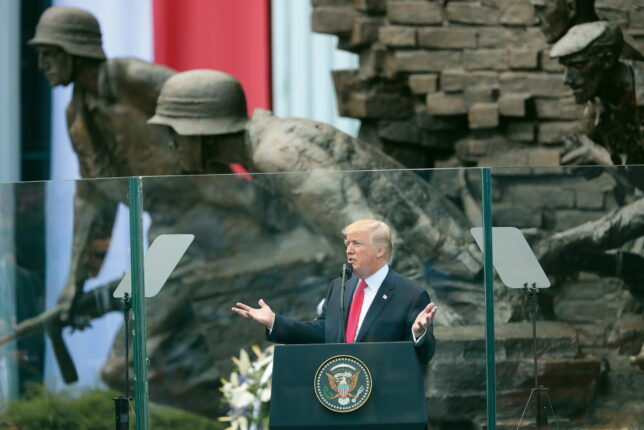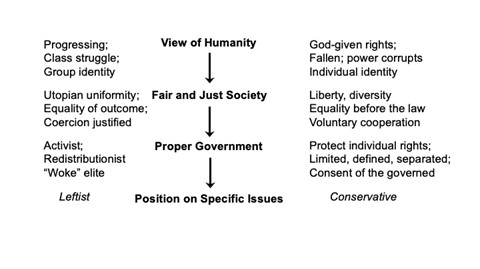Winning the Moral High Ground: Worldviews, Values, and Will to Survive

Winning the Moral High Ground: Five Rules for Political Messaging (full series)
Worldviews, Values, and Will to Survive | Struggle for the Moral High Ground
Five Rules for Effective Messaging | Getting Off Defense
Summary: The foundational issue facing America and the West is whether they have the will to survive. The Left has conducted a gradual but highly effective “long march through the cultural institutions” of education, news, entertainment, and other cultural institutions in order to wear away public confidence in the Judeo-Christian understanding of the values underlying our constitutional government in favor of a worldview that is more hospitable to their statist agenda. The Left has become so emboldened and so extreme in their rhetoric and tactics that the authoritarian reality behind their compassionate rhetoric is now becoming exposed. It is up to conservatives to make a more consistent and morally compelling case for conservative ideas and expose the moral vulnerabilities in the Left’s messaging and the destruction caused by applying the Left’s ideas.
In his 2017 speech in Warsaw, President Donald Trump cut through the myriad policy issues facing the West with a simple but profound challenge:
The fundamental question of our time is whether the West has the will to survive. Do we have the confidence in our values to defend them at any cost? Do we have enough respect for our citizens to protect our borders? Do we have the desire and the courage to preserve our civilization in the face of those who would subvert and destroy it?
In asking if we have the confidence in our values to defend them at any cost, President Trump cut to the foundational issue facing America and the West. Answer the question about whether a free nation has the confidence in its values to defend them at any cost, and you have gone a long way toward answering the question about whether that nation has the will to survive, to protect its borders, and to preserve its culture and its system of government in the face of the forces that would subvert and destroy it.
Worldviews, Values, and the Will to Survive
But what are those values? As I argued in “The Battle for America’s Unconscious Mind,” when citizens can shape the direction of their country through fair and honest elections, every debate about political policies and the proper role of government is ultimately a debate about the nation’s values, about which policies are the better civic means to a moral end, namely the creation of a fair and just society. If the different sides in a policy debate have a reasonably shared understanding of values such as fairness, equality, tolerance, compassion, justice, diversity, freedom, and other moral ideas that permeate our political language and shape our view of a morally desirable society, then it is possible to have productive debate and negotiation about which political policies are the better political means to achieve those shared moral ends. When the understanding of those values is radically different, however, the debate is no longer about which policies are the better means to achieve a morally desirable society but about the deeper question of what such a society should look like. Unfortunately, that is the situation we have now in the United States.
As I argued in that earlier piece, the Left has carried out a gradual but highly effective campaign known as the “long march through the cultural institutions” of education, news, entertainment, and other cultural institutions in order to wear away public confidence in the Judeo-Christian understanding of the values underlying our constitutional government in favor of a worldview that is more hospitable to their statist agenda. Figure 1 summarizes key points of that article and makes the critical point that conservative and leftist positions on any specific issue are always downstream from competing views of the nature of humanity, what a fair and just society should look like, and what type of government is needed to promote that morally desirable society.

Figure 1: From Moral Worldviews to Policy
In the conservative vision of a fair and just society, free individuals pursue their diverse talents and interests with minimal governmental coercion, cooperate voluntarily for mutual benefit, and enjoy equality before the law. This profound respect for liberty flows from the Judeo-Christian worldview of humans as morally responsible individuals possessing God-given rights. The conservative idea of defined, limited, and separated powers of government as the means of bringing about that fair and just society is a logical consequence of the Judeo-Christian recognition that humans are somehow fallen and therefore easily tempted to abuse governmental power for their own selfish ends unless that power is carefully checked.
The Left’s vision of a fair and just society as one striving toward greater uniformity and equality of outcomes derives in turn from a materialistic view of humans, not as unique, morally responsible individuals with God-given rights, but as demographic groups engaged in a class struggle for social and political power. Because a free society is by nature a diverse one, that kind of uniformity cannot be achieved voluntarily so coercive authority is morally justified to level out differences in status or achievement. Consequently, an activist government is needed that centralizes power in the hands of enlightened or “woke” politicians, bureaucrats, and experts to decide what is in the communal good and to mold society to fit their vision.
The success of the Left’s long march strategy is evident in the fact that conservatives, who believe in individual rights, freedom of speech, equality before the law, and decentralized governmental power are frequently labeled in the narrative of our cultural institutions as “authoritarian,” “threats to democracy,” and even “fascist.” In reality, however, the three major characteristics of authoritarian movements are increasingly evident in the goals and tactics of many on the American Left and their globalist allies:
- Rejection of the ideas of individual identity, moral responsibility, and inalienable rights in favor of group identity and a class struggle for political power among economic, racial, or other demographic groups;
- Rejection of the belief in consent of the governed in favor centralized power in the hands of an elite vanguard of enlightened politicians, bureaucrats, and allies in the cultural institutions who should decide what is in the communal good, and
- Control of information by the ruling elite, intolerance for opposing viewpoints as dangerous to the public good, and suppression of dissent coupled with harassment and oppression of dissenters.
A second point in that earlier article was that—as much as conservatives hold to the idea that voter behavior is influenced by facts, evidence, and reasoned arguments—decades of scientific research have demonstrated that political behavior is heavily influenced by unconscious, automatic reactions to subtle factors such as word choice and the moral context within which an argument is framed. Words trigger networks of mental and emotional associations, and they often do so without our conscious awareness. When every difference in achievement or status is framed in schools and news reports as a problem caused by unfair “privilege” in the absence of competing interpretations, for example, that one word prepares the psychological ground for class struggle and for political solutions involving government intervention and redistribution to correct the unfairness. Whether a political protest is portrayed as a “mostly peaceful demonstration” or a “riot” conveys an air either of moral legitimacy or illegitimacy along with the implied expectation that the authorities should deal leniently with the first and firmly with the second.
Whether weighing the points in a formal political debate, watching a newscast, or talking politics with friends and family, our interpretation of issues and events is always viewed, consciously or unconsciously, through the moral frames summarized in Figure 1 and shaped by the language we use to talk about those issues and events. Awareness of the implicit moral assumptions behind specific policy positions and the words we use to talk about them is essential to recognizing and evaluating the real implications of those policies.
In this article, I will take a deeper look at several of the values that are at the core of the division between Left and Right, and I will offer five rules for effective political messaging. Though primarily intended to help conservatives in making a more effective moral case for what we believe and why we believe it, those rules should also be useful to consumers of news and political communication who want to better recognize subtle efforts to influence their reaction to what they are hearing. I will end with some thoughts about an opportunity for conservatives that has arisen along with the threats to the Republic.
In the next installment, leftists and conservatives interpret the moral ideas of loyalty, authority, and sanctity very differently.
No comments:
Post a Comment